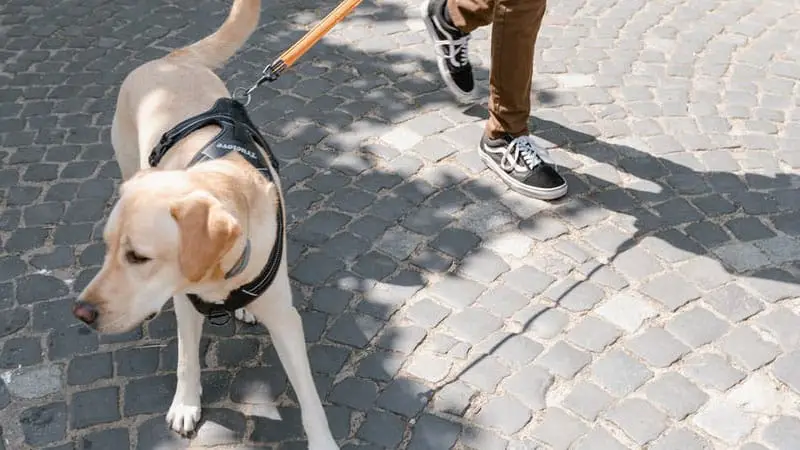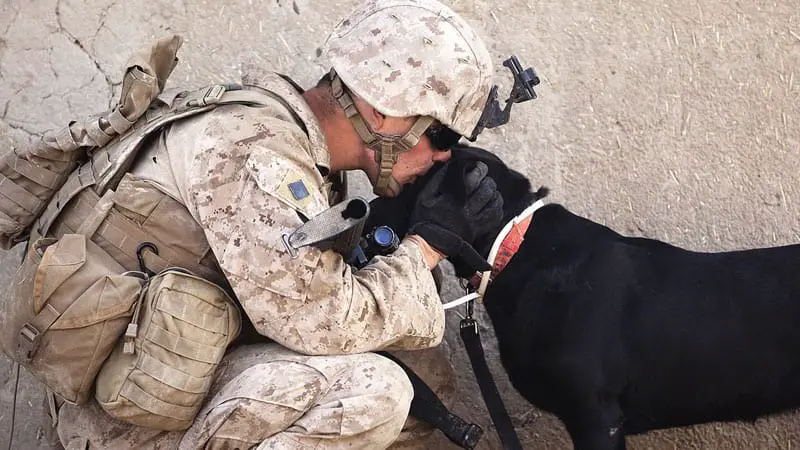A service dog helps someone with a disability take more control of their lives and live independently. Many people think they have to take their service dogs everywhere. However, there are times when it’s more practical and advisable to leave your service dog at home.
You can leave your service dog at home. For instance, when you have to attend a noisy function, stressful event, or worship service, you can leave your dog with a sitter or in a cage. Provide food, water, and protection from the weather.
There are those times when a handler has to make do without their loyal service dog. It’s normal to make trips outside the home without your service dog.
Do Service Dogs Have to Be with You at All Times?
When it comes to our relationship with service dogs, there are lots of misconceptions about the working functions, training, our reliance on them, and access to public facilities. The law offers lots of leeway on where we can go with our service dogs. Public property and private businesses are required by law to grant access to handlers and their service dogs.
What some people may not realize is it’s rare for the person with disability to rely on his service dog 100 percent of the time. You don’t have to be with your service dog all the time. In fact, there are many circumstances under which it’s preferable to leave your service dog at home. Such moments include:
When Going into A Stressful Environment
If you hate going to the dentist’s, your service dog will sense your fear and apprehension. The dog will most likely act to guard you against enemies, in this case the dentist and assistants.
Whenever you’re going to any stressful environment which causes you stress, anxiety, or pain, it’s better to rely on a human companion rather than your service dog.
Noisy Places

If you work in a factory or have to visit a factory, you’re likely to encounter people with different kinds of machinery. There might be metal clanging against metal, noises from bells and whistles, and people shouting over the sound of heavy machinery.
In such a scenario, even some of the calmest dogs may adopt an aggressive stance. A tense and aggressive dog may not follow your commands, may attack others, or may put you in danger.
Sterile Environments
Some areas within hospitals and laboratories require high standards of sterilization. While service animals are by law permitted anywhere in the hospital where the public is allowed, your dog can’t go into certain sterile environments, such as surgical rooms. So if you have to visit such restricted areas, leave your dog at home.
Dog Not Housebroken
Taking your dog to other people’s homes requires a certain level of trust and diplomacy. However, taking a non-housebroken dog is just rude and borderline unethical. If your service dog is still potty-training, leave them home until they’re housebroken.
According to U.S. Code of Federal Regulations 36.202(c)(2)(ii), owners or managers of a private business are allowed to remove a service dog and its handler from the premises if the dog is urinating or defecating in unacceptable places.
However, the business is then under obligation to provide the person with disability the opportunity to obtain goods, services, and accommodations without the service dog present. If you can, alert the business early that you’ll need special assistance without your service dog present.
Rowdy Activities
Most of us enjoy some occasional high-energy noisy fun. Maybe a football game at the park, loud video games, or some paintball. In some instances, your dog can be part of the fun. However, it’s not always so, even with well-trained dogs who have demonstrated they can ignore distractions and focus on their handler.
If your dog gets territorial or aggressive around loud friends then you’re probably better off leaving the dog at home. If your dog misunderstands your shouting for alarm, they could act to defend you. Apart from the loud activities, dogs might bite into paintballs during play and these can be toxic.
Places of Worship
The Americans with Disabilities Act (ADA) exempts places of worship in regards to service, assistance, and emotional support animals. If you’ll be attending church, mosque, synagogue, temples, or other religious venues then you might have to go without your dog.
Private clubs are also exempt from the ADA law that requires venue managers to allow service dogs and their handlers.
Can I Leave My Service Dog at Home?

Usually, a service dog is with its handler but there are times when you have to leave the dog at home. It’s not recommended to separate the dog and its handler for more than a few hours at a time. However, when it’s unavoidable, you can leave your dog at home with the following safety and comfort requirements.
Time
The handler should plan to be back within at most six hours.
Sitter
Have someone check on the service dog, especially if you have severe disabilities or might take longer than a couple of hours.
Crate
Well trained service dogs can hold their pee and potty for up to eight hours. You can leave your dog in a crate with some toys and water.
Food and Water
Leave enough food and water for your service dog. If you won’t be gone beyond the dog’s scheduled feeding time, you can only leave water and wait till you’re back before feeding them.
Access to Potty
Let your dog have access to the potty area if you’ll be away longer than a couple of hours.
Weather Protection
Ensure your dog is protected from excess heat, cold temperatures, and strong winds while you’re away.
Your Safety
In the absence of your service dog, you may have to rely on other people for assistance. Make sure you have a trusted person to help you around when you’re away from your dog.
Can You Treat a Service Dog Like a Pet?
Like other dogs, your service dog is a companion. However, as a service dog it has special functions which dictate how you can or can’t treat it.
While the dog might look cute and perform entertaining acts, they in many instances perform life and death duties. The dog is an extension of the handler and both rely on each other to live a full life. There are several differences in how handlers and others should treat a service dog and a normal pet dog. For handlers:
- Keep your service dog away from other dogs.
- Be consistent with your training and commands. For instance, don’t allow a wide move from the heel position.
- Don’t give your dog free run of the place unless at home or in specific play yards. The dog should lie at your feet when you’re stationed in one place for long.
If you meet a handler with their service dog, don’t treat the dog like other pets. Here are some social rules when you come in contact with a service dog and its handler:
- Approach the handler, not the dog.
- Don’t offer treats or try to pet the dog.
- If a service dog is unattended, the owner might be in danger. Find help.

